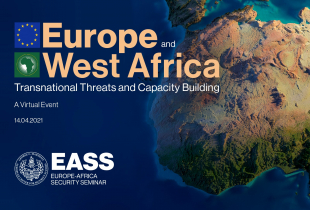
Somalia’s Impasse and Implications for Europe
Introduction
Participants from Europe, Africa, the Middle East, and the United States gathered online to discuss Somalia’s developments as part of the Southern Watch Series (SWS) in March 2021. The SWS is an ongoing series of virtual conversations surveying current and emerging security challenges in Africa and the Middle East, and their implications for Europe and the United States. It is an initiative of the Marshall Center’s European Security Seminar – South. The conversation featured remarks from Mr. Omar Mahmood of the International Crisis Group and Mr. Ahmed Soliman of Chatham House. These highlights reflect non-attribution takeaways that emerged from group discussion and do not represent the views or positions of any individual panelist or participant.
Somalia’s presidential impasse is fast becoming a deep political and social cleavage unlikely to be bridged by a new election.
The term of President Mohamed Abdullahi Mohamed ‘Farmaajo’ lapsed in February 2021, and his decision to remain in power is poisoning the political landscape and rousing broad disapproval of the government. Farmaajo’s tenure already traded a pragmatic federalism for ambitions of centralization, which elicited resistance from opponents and within the Federal Member States. Somalia has now reached a pivotal moment, as the fight around Farmaajo calls into question the overall state-building project in Somalia. The international community’s insistence on a ‘one-person, one-vote’ national ballot may be unrealistic, and an election is unlikely to repair the damage done to Somalia’s fledgling federal institutions and their fragile legitimacy.
Robust mediation would help resolve the political deadlock.
The United States, European countries, and other external actors could exert greater pressure on Somalia’s political elites, especially those within the government, in order to bring about a practical resolution to the political deadlock. Donors fund most of Somalia’s federal budget and remain essential to Somalia’s security, which provides them with considerable leverage. Using that influence simply to convene Somalia’s factions will probably not yield a solution regarding the head of state. The situation may require active third-party mediation that will oblige rivals to address differences and compromise, followed by technical assistance to functional mechanisms that implement an agreement. The United Nations Assistance Mission in Somalia (UNSOM) has a mandate and presence that could make it a natural fit for these critical duties.
AMISOM has a difficult transition ahead.
The mandate for the African Union Mission in Somalia (AMISOM) has been renewed through 2021, but reorienting AMISOM for an imminent hand-off to the Somali National Army (SNA) is fraught with pitfalls. The Mission has begun delivering bases to SNA control and has managed to conduct a few joint operations with SNA general forces, not just the specially trained Danab commandos. However, the stalemate with Al-Shabaab remains unbroken and the terrorist group has not been challenged at its one core vulnerability, namely a popular revolt by ordinary Somalis under its de facto rule. As AMISOM enters its fifteenth year, the cost in blood and treasure has sapped its will to fight and fatigued its funders. The Mission risks disintegrating rather than bowing out in the coming months. AMISOM may become even more disjointed, as Ethiopia’s forces are drawn away to the Tigray conflict and Kenya’s contingent is drawn into Nairobi’s tensions with Mogadishu over Somali refugees, border management, and the maritime boundary dispute. Aligning AMISOM operations to the local needs of different Federal Member States could further fragment and politicize the Mission as well.
An expanded international community now influences Somalia.
The European Union, United Kingdom, United Nations, and United States have traditionally been the leading external actors in Somalia. Today, the international community engaged in the country is more diverse and divided. Turkey has become a central player across the last decade; Saudi Arabia, the United Arab Emirates (UAE), and Qatar have courted Mogadishu with port projects and financial investments. Western strategies and envoys for the Horn and Red Sea must acknowledge the rising role of such actors on the ground in Somalia and the region. Where possible, Europe and the United States should look for baseline actions and diplomatic approaches that can rally Somalia’s disparate international partners. Interaction among the United States, United Kingdom, the UAE, and Saudi Arabia during Sudan’s transition might offer some insights.
GCMC, 31 March 2021
About the Author
Dr. Benjamin P. Nickels is Professor of International Security Studies and Director of the European Security Seminar – South (ESS-S) at the George C. Marshall European Center for Security Studies. He leads the Marshall Center’s resident, outreach, virtual, and partnership programming on European and U.S. relations with North Africa, Sub-Saharan Africa, and the Middle East.
The George C. Marshall European Center for Security Studies
The George C. Marshall European Center for Security Studies in Garmisch-Partenkirchen, Germany is a German-American partnership and trusted global network promoting common values and advancing collaborative geostrategic solutions. The Marshall Center’s mission to educate, engage, and empower security partners to collectively affect regional, transnational, and global challenges is achieved through programs designed to promote peaceful, whole of government approaches to address today’s most pressing security challenges. Since its creation in 1993, the Marshall Center’s alumni network has grown to include over 16,000 professionals from 160 countries. More information on the Marshall Center can be found online at www.marshallcenter.org.
The Clock Tower Security Series provides short summaries of Seminar Series hosted by the George C. Marshall European Center for Security Studies. These summaries capture key analytical points from the events and serve as a useful tool for policy makers, practitioners, and academics.
The articles in the The Clock Tower Security Series reflect the views of the authors and are not necessarily the official policy of the United States, Germany, or any other governments.
